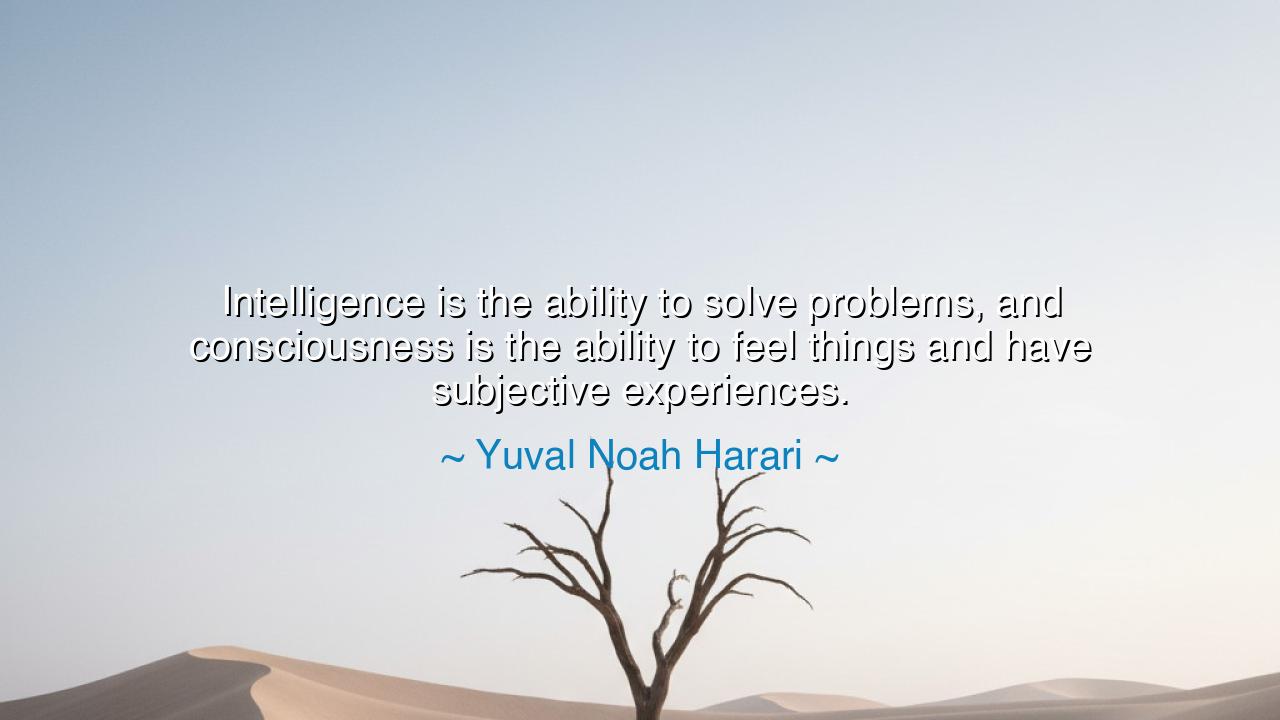
Intelligence is the ability to solve problems, and consciousness
Intelligence is the ability to solve problems, and consciousness is the ability to feel things and have subjective experiences.






In the profound and discerning words of Yuval Noah Harari, historian, philosopher, and chronicler of the human journey, we encounter a truth that pierces the veil between mind and spirit: “Intelligence is the ability to solve problems, and consciousness is the ability to feel things and have subjective experiences.” These words are not mere academic observation — they are the echo of an ancient question: What does it mean to be alive? For millennia, humankind has celebrated its intelligence, but Harari reminds us that intelligence alone is not the fullness of being. To solve a problem is a function of the mind, but to feel, to love, to suffer, to dream — that is the work of the soul.
The origin of this quote lies in Harari’s reflections on the relationship between artificial intelligence and human consciousness. In his book Homo Deus, he warns of a future where machines may surpass humans in intelligence — faster, more precise, more powerful — yet utterly devoid of feeling. He makes a crucial distinction: intelligence creates capability, but consciousness creates meaning. A machine can calculate a cure, but it cannot understand pain. It can compose a melody, but it cannot be moved by its beauty. Through this contrast, Harari does not diminish intelligence — he simply restores consciousness to its rightful throne as the heart of humanity’s worth.
To understand this wisdom, one must see that intelligence is external, while consciousness is internal. Intelligence manipulates the world; consciousness reveals the self. Intelligence can design tools to conquer nature, but consciousness teaches compassion for it. The one sharpens; the other softens. The one builds cities; the other nurtures hearts. Harari’s message is therefore a balance — a warning that as our world races toward artificial minds, we must not abandon the feeling heart that makes us human.
History gives witness to this balance. Consider the story of Alan Turing, the father of modern computing. His intelligence helped end a world war by breaking the Enigma code, saving countless lives. Yet, in his own time, society’s lack of consciousness destroyed him — condemned not for his intellect, but for his identity. Here lies the tragedy Harari speaks of: a civilization brilliant enough to solve the hardest problems, yet blind to its own cruelty. Intelligence triumphed, but compassion failed — and the victory was stained with sorrow. Thus, progress without empathy becomes a hollow crown.
Harari’s distinction also reveals the mystery of what it means to truly live. Many people spend their days thinking, but few spend them feeling. They solve problems, achieve goals, build empires — yet their inner world lies barren. They confuse motion for meaning, success for joy. But consciousness invites us to experience the depth of existence — to feel the warmth of sunlight, the ache of loss, the awe of beauty. Intelligence creates a world where we can live longer; consciousness teaches us why we should wish to. Without feeling, life becomes a machine’s rhythm — efficient, but empty.
And yet, Harari’s teaching is not despair, but awakening. He calls us to remember that the greatest achievements of humankind — art, poetry, music, love, sacrifice — are not born of problem-solving, but of subjective experience. When Van Gogh painted his swirling skies, when Beethoven composed while deaf, when a mother holds her child for the first time — these moments are the triumph of consciousness. They cannot be programmed, measured, or replicated. They arise from that sacred spark within, that awareness that says, “I feel, therefore I am.”
Therefore, O listener, take this wisdom into your heart: do not worship intelligence without honoring consciousness. Cultivate your mind, yes — sharpen it like a blade, use it to heal, to build, to reason. But do not let it silence your capacity to feel. In an age of machines, to feel deeply is an act of rebellion, and to love is a declaration of humanity. Seek not only to solve, but to understand. Seek not only to think, but to feel. For in doing so, you will not only be intelligent — you will be alive.
And so, as Yuval Noah Harari teaches, let us build a future not of clever minds alone, but of awakened souls. Let intelligence serve consciousness, not replace it. Let us remember that our greatest strength lies not in what we can calculate, but in what we can care for. For though machines may one day outthink us, they will never out-feel us — and it is through feeling, through compassion, through awareness, that humanity shall endure and remain divine.






AAdministratorAdministrator
Welcome, honored guests. Please leave a comment, we will respond soon